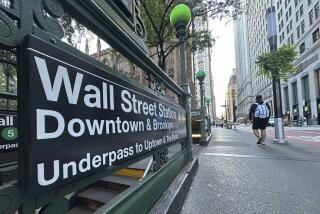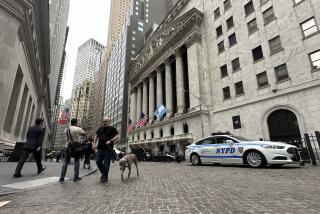DOW, S&P; 500 UP FOR 4TH DAY
- Share via
NEW YORK — Investors have reason to be thankful for the first time in a while.
The stock market Wednesday stitched together its first four-day rally since May, thanks to an incipient wave of confidence in the federal government’s attempts to spur the economy.
The Dow Jones industrial average surged almost 250 points, and its 16% advance since Thursday marked its biggest four-day rally since 1932, during the Great Depression.
The Standard & Poor’s 500 index has rocketed 18% since it sank to an 11-year low Nov. 20, its best four-day streak since 1933.
The day’s gains were broad-based. The Dow rose 247.14 points, or 2.9%, to 8,726.61. The S&P; 500 climbed 30.29 points, or 3.5%, to 887.68. The technology-heavy Nasdaq composite index shot up 67.37 points, or 4.6%, to 1,532.10.
Measures of small and mid-size stocks, which typically rise in anticipation of economic recoveries, rose more than 5%.
Rising stocks outnumbered decliners by more than 5 to 1 on the New York Stock Exchange.
“On the surface, it was a pretty good day,” said John Bollinger, head of Bollinger Capital Management in Manhattan Beach. “But under the surface, it was a much better day than it first appeared.”
As they have in recent days, stocks withstood a gust of bad economic news.
Americans cut their spending by 1% last month, the largest decline since the last recession in 2001, while orders for durable goods such as washing machines shrank 6.2%, the Commerce Department said Wednesday. Also, the Reuters/University of Michigan index of consumer sentiment dropped to its lowest level in 28 years.
Shares of General Motors Corp. and Ford Motor Co. rallied after a Deutsche Bank analyst predicted that the automakers would present aggressive plans to revamp themselves to qualify for federal bailout money.
Citigroup Inc. rose 16%. It is up 87% since getting a second round of government assistance Sunday.
The S&P; financial index has risen 32% in the last week.
Energy stocks surged as crude oil rose sharply for the second time in three days, finishing up $3.94 a barrel at $54.71.
Shares of Chevron jumped 4.4% while Exxon Mobil rose 3.6%. The S&P; index of energy companies rose 5.7%.
Some consumer technology stocks gained on hope for stronger-than-expected holiday season sales.
Apple climbed 4.6% while Dell jumped 6%.
There didn’t appear to be a single catalyst behind the market’s advance, most of which came in the last two hours of trading, but investors appeared comforted by recent steps by the government to jump-start the economy.
The Federal Reserve announced an $800-billion plan Tuesday to breathe life into the home mortgage and consumer credit markets.
Stock investors also were comforted by comments by President-elect Barack Obama, who pledged that his administration would be ready to focus on the economy from his first day in office.
After several weeks in which talk centered on whether the economic downturn would rival the Depression, many investors now expect that the current recession, even if it turns out to be one of the worst since World War II, will end up far less severe than the worst-case scenarios.
Still, many market watchers expect stock prices to be volatile for several months until the extent of the downturn becomes apparent.
The stock market’s growing confidence in the economy didn’t extend to the bond market Wednesday as yields on government obligations fell, suggesting more fear about the severity of the downturn.
The three-month Treasury bill’s annualized yield fell to 0.03% from 0.1% on Tuesday. The benchmark 10-year T-note fell to 3.00% from 3.09%.
Although volume was light Wednesday, with many traders already gone for Thanksgiving, the market’s ability to extend its rally was seen as a bullish sign.
The advance stemmed in part from so-called short covering, Bollinger said.
As prices cascaded lower this fall, short sellers, who sell borrowed shares in an effort to profit from expected price declines, placed increasingly large bets. But they got pinched in the market’s sharp reversal in recent days and were forced to quickly buy stock to close out their bets.
“The shorts are starting to feel a little bit of fear,” Bollinger said. “That’s what creates days like this. They’re moving to lighten up their positions.”
--
More to Read
Inside the business of entertainment
The Wide Shot brings you news, analysis and insights on everything from streaming wars to production — and what it all means for the future.
You may occasionally receive promotional content from the Los Angeles Times.










